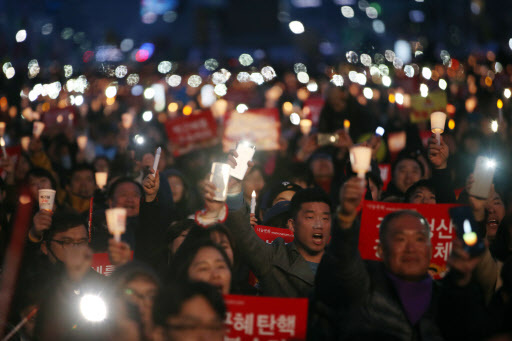Following the monthslong street rallies that peacefully removed President Park Geun-hye from office, some politicians in South Korea say that the protesters should be nominated for the Nobel Peace Prize for being a role model for other troubled democracies.
Massive protests by citizens holding candles pushed the parliament to vote to impeach Park on Dec. 9 over a corruption scandal involving Park’s friend Choi Soon-sil. It was upheld by the Constitutional Court on March 10, which many hailed as a victory for the people.
 |
(Yonhap) |
According to rally organizers, a total of 16.5 million people have taken part in 20 candlelit vigils against the disgraced leader since the scandal erupted in late October.
Seoul Mayor Park Won-soon, one of the first political bigwigs to call for Park’s impeachment, said that South Koreans deserve global recognition for their commitment to peace during the rallies.
“In political turmoil, there have been many physical clashes or terror attacks, but our candlelit vigils have not seen violence or accidents,” Park said in an interview with a local news agency. “The movement deserves to be called the citizens’ ‘Glorious Revolution.’”
The mayor said he has collected material on the candlelight vigils ranging from placards to makeshift tents, which he can provide to help citizens be put up for the honorary prize.
Rep. Chun Jung-bae of the centrist opposition People’s Party said the rally organizers should be recommended for the prize.
The rallies were led by an association of over 1,500 civic groups.
“It is a role model for the world’s democracy in that the world’s only divided country ridden with strife and military conflicts has overcome its history of war and dictatorship and finally achieved a people’s revolution,” Chun said in a statement.
“We will be able to nominate the rally organizers by collecting signatures from the public and passing a resolution reflecting public sentiment,” he said.
Lawmakers including Reps. Woo Won-sik and Min Byung-doo of the Democratic Party of Korea and Park Jie-won of the People’s Party also echoed similar views.
But questions remain over whether it is possible.
With the backing of qualified individuals including parliamentary members, governments and Nobel Prize winners, it is possible for an organization or movement to be nominated for the Nobel Peace Prize.
The deadline for this year’s nomination application was Jan. 31, which means it is too late for the candlelight movement to be shortlisted for the 2017 prize. The winners of the Nobel Prize in various categories will be announced in October.
The candlelight rallies, which continued until March 11, could still set its sights on the 2018 prize, which opens in September.
A movement and a group can be awarded a Nobel Peace Prize as seen in previous examples.
In 1997, the US-based International Campaign to Ban Landmines and its coordinator Jody Williams won the Nobel Peace Prize. The Nobel Committee lauded them for “their work for the banning and clearing of anti-personnel mines.”
In 2015, the Tunisian National Dialogue Quartet, established in 2013, received the Nobel Peace Prize for its decisive contribution to the building of a pluralistic democracy in the country in the wake of the Jasmine Revolution, which was an intensive campaign of civil resistance that led to the ousting of longtime President Zine El Abidine Ben Ali in January 2011.
Other than the Nobel Peace Prize, the rally organizers also eye the “Disobedience Reward” newly established by the Massachusetts Institute of Technology in the US. They said they would consult with citizens on whether to apply for the award.
The university’s Media Lab said on its website that it will offer $250,000 to a person or group of people engaged “in what we believe is extraordinary disobedience for the benefit of society.”
The winner will be announced in July. The deadline for submissions is May 1.
By Ock Hyun-ju (
laeticia.ock@heraldcorp.com)




![[Weekender] Korea's traditional sauce culture gains global recognition](http://res.heraldm.com/phpwas/restmb_idxmake.php?idx=644&simg=/content/image/2024/11/21/20241121050153_0.jpg)



